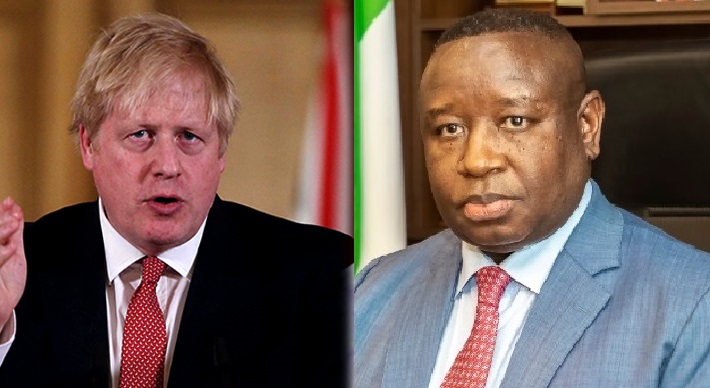British Premier Boris Johnson has announced a proposal to send unauthorized migrants to Rwanda for processing.. Base on this new policy, unauthorized migrants from Africa, Asia and other nationals will be affected.
Boris Johnson on Thursday announced a range of new measures to combat unauthorized migration to the UK, including a deal with the central African country of Rwanda to outsource the processing of asylum applications.
The unveiling of the measures comes as Johnson is widely accused of seeking to distract from the so-called Partygate scandal, in which he and other leading political figures were fined earlier this week for breaking the government’s own coronavirus lockdown rules.

 Outsourcing to Rwanda
Outsourcing to Rwanda
In his speech on the new measures, Johnson outlined the plan to send asylum seekers to Rwanda to have their applications processed. Rwanda on Thursday announced that the UK’s interior minister, Priti Patel, had signed a deal to that effect with the central African country.
Johnson said that the risk of asylum seekers ending up in Rwanda rather than the UK would be a “considerable deterrent” over time.
He also said that the partnership with Rwanda would become a standard method internationally of addressing the challenges of migration.
Johnson defended the plan against criticism by rights groups, saying: “We are confident that our new Migration Partnership is fully compliant with our international legal obligations, but nevertheless we expect this will be challenged in the courts, and if this country is seen as a soft touch for illegal migration by some of our partners, it is precisely because we have such a formidable army of politically motivated lawyers who for years who have made it their business to thwart removals and frustrate the government.”
Announcing the signing of the deal, Rwandan Foreign Minister Vincent Biruta said in a statement that “Rwanda welcomes this partnership with the United Kingdom to host asylum seekers and migrants, and offer them legal pathways to residence.”
The controversial proposal, which some media say would involve only male asylum seekers, comes after Patel failed to reach similar deals on outsourcing asylum processing to Albania and Ghana. To the British government’s embarrassment, in both instances it had leaked information on a deal being sealed only for the countries in question to then refute that claim.
The Rwandan government has been accused by Human Rights Watch of numerous human rights violations, including the frequent “arbitrary detention, ill-treatment, and torture in official and unofficial detention facilities” of government opponents.
Australia’s policy on outsourcing asylum processing to other countries has been taken as a model worthy of emulation by several ministers in Johnson’s government, even though it has been heavily criticized by rights organizations and the UN. Johnson also made a great show of adopting an “Australian-style points-based immigration system” both before and after exiting the EU.
Opposition Criticism
The deal with Rwanda will reportedly cost an initial 210 million pounds (€144.4 million, $157.6 million), but the opposition Labour Party, which has slammed the plan, says it will end up being much more expensive.
“It is an unworkable, unethical and extortionate policy that would cost the UK taxpayer billions of pounds during a cost of living crisis and would make it harder, not easier, to get fast and fair asylum decisions,” said Yvette Cooper, the shadow interior minister.
She said the proposal was “meant to distract from Boris Johnson’s recent law-breaking.”
Last year, more than 28,000 migrants and refugees crossed from Europe to Britain, many in small dinghies, despite the government’s many pledges to curb such migration attempts.
Navy control of Channel
Other measures mentioned by Johnson included putting the navy in charge of supervising operations in the English Channel and setting up a reception center for asylum seekers, reportedly in North Yorkshire.
“From today, the Royal Navy will take over operational command from Border Force in the Channel with the aim that no boat makes it to the UK undetected,” Johnson said.
He announced extra funds for boats, aircraft and surveillance equipment to patrol the Channel and detain people smugglers.
“This will send a clear message to those piloting the boats. If you risk other people’s lives in the Channel, you risk spending your own life in prison,” he said.


 Post a comment
Post a comment

 Outsourcing to Rwanda
Outsourcing to Rwanda







Comment(s)
Disclaimer: Comments expressed here do not reflect the opinions of Sierraloaded or any employee thereof.
Be the first to comment